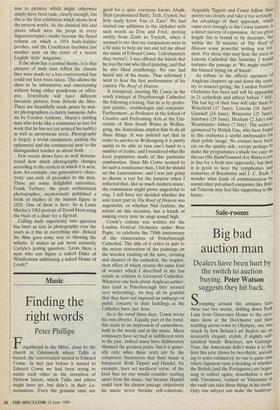Music
Finding the right words
Peter Phillips
Forgathered in the Mitre, close by the church in Greenwich where Tallis is buried, the conversation turned to Edward Cowie. In fact just before it turned to Edward Cowie we had been trying to outdo each other in the invention of Hebrew letters, which Tallis and others might have set, but didn't, in their La- mentations. Even the genuine ones are good for a quiz: everyone knows Aleph, Beth (pronounced Bett), Teth, Gymel; but how many know Vau or Zain? We had started our additions to the alphabet with such words as Don and Fred, moving swiftly from Zonk to Toyleth, when it seemed to me that my companions were in a fit state to help me out and tell me about the music of Edward Cowie. Unfortunately they weren't. I was-offered the hunch that he was the one who liked painting, and that he also liked ornithology. No one had heard any of his music. Thus informed I went to hear the first performance of his cantata The Roof of Heaven.
It transpired, meeting Mr Cowie in the south transept of Peterborough Cathedral the following evening, that he is by profes- sion painter, ornithologist and composer. Furthermore, as Professor at the School of Creative and. Performing Arts at the Uni- versity of New South Wales in Wollon- gong, the Australians employ him to do all these things. It was pointed out that in order to survive in Wollongong it is pretty useful to be able to turn one's hand to a number of trades, and I wondered what the local population made of this particular combination. Since Mr Cowie seemed to be such a renaissance man, I felt he should set the Lamentations, and I was just going to choose a text for the purpose when I reflected that, like so much modern music, the commission might prove ungrateful to sing. I still have not decided whether the solo tenor part in The Roof of Heaven was ungrateful, or whether Neil Jenkins, the soloist on this occasion, has a knack of making every note he sings sound high.
Cowie's cantata was written for the London Festival Orchestra under Ross Pople, to celebrate the 750th anniversary of the consecration of Peterborough Cathedral. The title of it refers in part to the recent restoration of the paintings on the wooden vaulting of the nave, crossing and chancel of the cathedral, the resplen- dent effect of which creates the same kind of wonder which I. described in my last article in relation to LiVerpool Cathedral. Whatever one feels about Anglican author- ities (and in Peterborough they seemed very welcoming), we may all be grateful that they have not imposed an embargo on public concerts in their buildings as the Catholics have just done.
As is the trend these days, Cowie wrote his own libretto. Equally part of the trend, this leads to an impression of earnestness, both in the words and in the music. Many composers have set bad or indifferent texts in the past, indeed many have deliberately shunned the greatest poets, but it is gener- ally only when these texts are by the composers themselves that their music is hampered. Both Tippett and Handel, for example, have set mediocre verse, of the kind that no one would consider reciting apart from the music, but because Handel could view his chosen passage objectively his music never became self-conscious. Arguably Tippett and Cowie follow their poetry too closely and take it too seriously. An advantage of their approach, which came over strongly in the Cowie cantata, is a direct naivety of expression. At too great length this is bound to be tiresome, but within the 20 minutes of The Roof of Heaven some powerful writing was evi- dent. For those who may hear the piece in Lincoln Cathedral this Saturday I would instance the passage at 'We might receive the blessed laying on of hands'. As tribute to the official openness of Anglican chapters up and down the coun- try to concert-giving, the London Festival Orchestra has been and will be appearing in 21 cathedrals and abbeys before 7 July- The last leg of their tour will take them to Wakefield (17 June), Lincoln (18 June), Llandaff (24 June), Worcester (25 June), Salisbury (29 June), Hexham (2 July) and Westminster Abbey (7 July). The series is sponsored by British Gas, who have found in this orchestra a useful ambassador for their public image. No corners have been cut on the quality side, except perhaps to make the programmes a shade too easy on the ear (the Each/Gounod Ave Maria is not in line for a fresh new approach); but then it is good to hear the symphonies and concertos of Boccherini and J. C. Bach. I wonder what kinds of communication by sound other privatised companies like Brit- ish Telecom may feel like supporting in the future.


















































 Previous page
Previous page